Is a Phillies World Series win an indicator of a recession? Here’s what experts say.
Will a Phillies victory spell economic doom? “Past performance is not indicative of future results.”

Are the Phillies, to the extent they succeed in their World Series struggle against Houston, threatening the nation with economic doom?
Superstitious investors who aren’t Philadelphia fans may have been relieved that the team started as underdogs in their World Series against the Astros, whom gamblers favored.
That’s because the city’s baseball victory record, as well-known by local stock-watching baseball fans and dourly repeated this fall by financial reporters from the Wall Street Journal to Marketwatch, has been accompanied by financial disaster and economic dislocation:
The Philadelphia Athletics won the 1929 World Series, two weeks before the 1929 stock market crash that started the Great Depression.
The Phillies’ first-ever 1980 World Series victory arrived amid rising prices, falling stocks, and mass layoffs — an economic drag so worrying it convinced Americans that fall to dump President Jimmy Carter and elect Ronald Reagan, who presided over an economic recovery matched by a Phillies playoff drought.
The Phillies clinched the 2008 World Series, just in time for the stock market crash that sparked the Great Recession, again throwing millions out of work.
These victories are so rare that a Phillies team mere games from the title has indeed come to suggest “something is off the rails in the cosmos,” a tongue-in-cheek Mark Zandi, chief economist at West Chester-based Moody’s Analytics, told the Journal. Bruce Van Saun, boss of Citizens Bank, which owns naming rights to the Phils’ ballpark, loyally balked at the suggestion the Phils’ reaching the Series is anything but good.
Indeed, any playoff game at the South Philly stadium district boosts the regional economy, bringing millionaire players and thousands of fans to area hotels and restaurants. The teams even noticeably fatten city wage tax collections.
» READ MORE: A Philly success story: Celebrating winning sports teams is more fun in a walkable city
As Charles Dougherty, economist at Wells Fargo Securities (and a Philadelphia native), reminded clients Friday, the Phillies have lost more games in their long history than any other Major League Baseball team.
But Dougherty, after calling the Phils’ National League championship “surprising,” is not making any personal predictions, citing an old Wall Street pitchmen’s cover-your-back warning: “Past performance is not indicative of future results.”
Instead, he and his team put out a report just before the first game — The Economics of the 2022 World Series — comparing some of Philadelphia’s and Houston’s more durable economic attributes and prospects. Some highlights:
Houston is growing faster than Philly ...
“In contrast to Philadelphia,” Houston has grown rapidly in most years since its population passed Philadelphia’s in 1984, replacing our town as the fourth-largest U.S. city (after New York, Los Angeles, and Chicago).
... but Philly has less unemployment than Houston
But most recently, after its long-dominant oil-and-gas industry stumbled, Houston’s growth has slowed. It has lately posted slightly higher unemployment than Philadelphia — and twice as much vacant office space. It’s as if Texas developers, accustomed to growth, can’t help betting more prosperity is just ahead, even though local landlords are running out of tenants, at least for now.
Philly is ahead in biotech investments ...
Both Philadelphia and Houston have turned to biotech for future growth.
Dougherty noted Philadelphia’s commercial space is cheaper than in almost any other big-city metro area. And the city, along with its suburbs, has plenty of extra space to turn into labs. “Only Boston, San Francisco and San Diego have more square feet of lab and R&D space under construction,” according to the report.
... but Houston isn’t far behind
Houston also has its own university teaching hospitals, and the city’s new 37-acre Texas Medical Center Helix Park is luring biotechs, too.